THE LANDSCAPING SOLUTIONS BLOG
Welcome to our Blog. Inspiration, updates and industry trends from the team at Landscaping Solutions.
THE SUSTAINABLE AESTHETIC
In late 2019 we collaborated with Jilayne Rickards on a small urban garden she designed for a great client in North London. Jilayne christened the scheme ‘The Urban Retreat’.
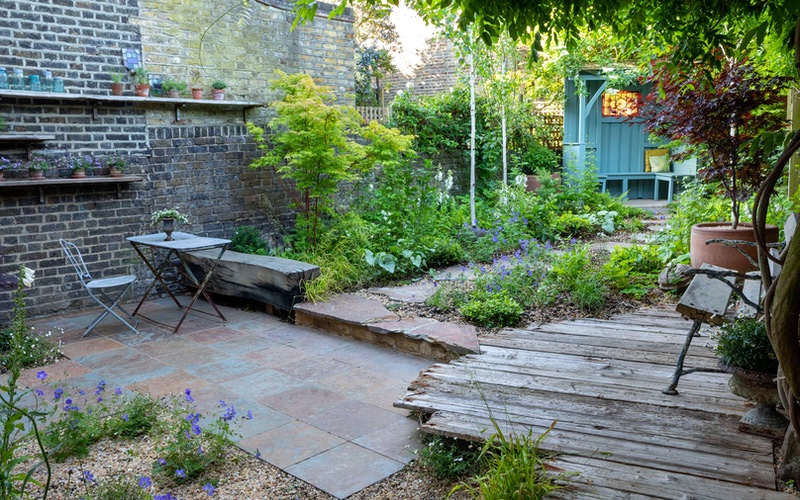
The Urban Retreat in North London, designed by Jilayne Rickards and built by Landscaping Solutions.
Jilayne’s vision was for the garden to be both beautiful and sustainable. In December last year we discovered the garden had picked up four British Association of Landscape Industries awards. The most satisfying of these for us was the award for best use of recycled and reclaimed materials. The recognition this garden received from BALI and the interest and acclaim it has garnered from the wider public offers hope for what we call ‘The sustainable aesthetic’. The more media coverage gardens of this type obtain the more they will come to be considered desirable by the general public and the more likely their guiding ethos will become mainstream thought.

Reclaimed Douglas Fir decking, one of the many recycled and reclaimed materials used throughout the garden.
What is the ethos of the sustainable aesthetic and why is it important? The sustainable garden weathers well in the British climate, blends in with its surroundings, accommodates and encourages interaction with wildlife and does not damage the environment in its creation. It follows a number of principles;
Protect and nurture the holy trinity of soil, plants and insects. Do this and good things will follow. In ‘The Urban Retreat’ all soil was kept on site.
Reduce waste. In this garden all existing pots and planters were recycled along with the brick work. Paving sub-base materials were re-used where appropriate or sent for off-site recycling with any green waste produced. Energetic waste can also be reduced by designing closed systems and features that have multiple benefits. For example, planting Comfrey for its aesthetic appeal, ability to attract and feed insects, provision of composting material and medicinal applications.
We can further reduce waste by working with the existing lay of the land, soil type, microclimate, ‘hard’ and ‘soft’ vernacular, moisture levels, ‘habitat’ type, etc. The existing garden had a woodland edge feel and Jilayne used this to inform her plant choices. Woodland edge gardens are cooling and relaxing in the heat of a city summer.
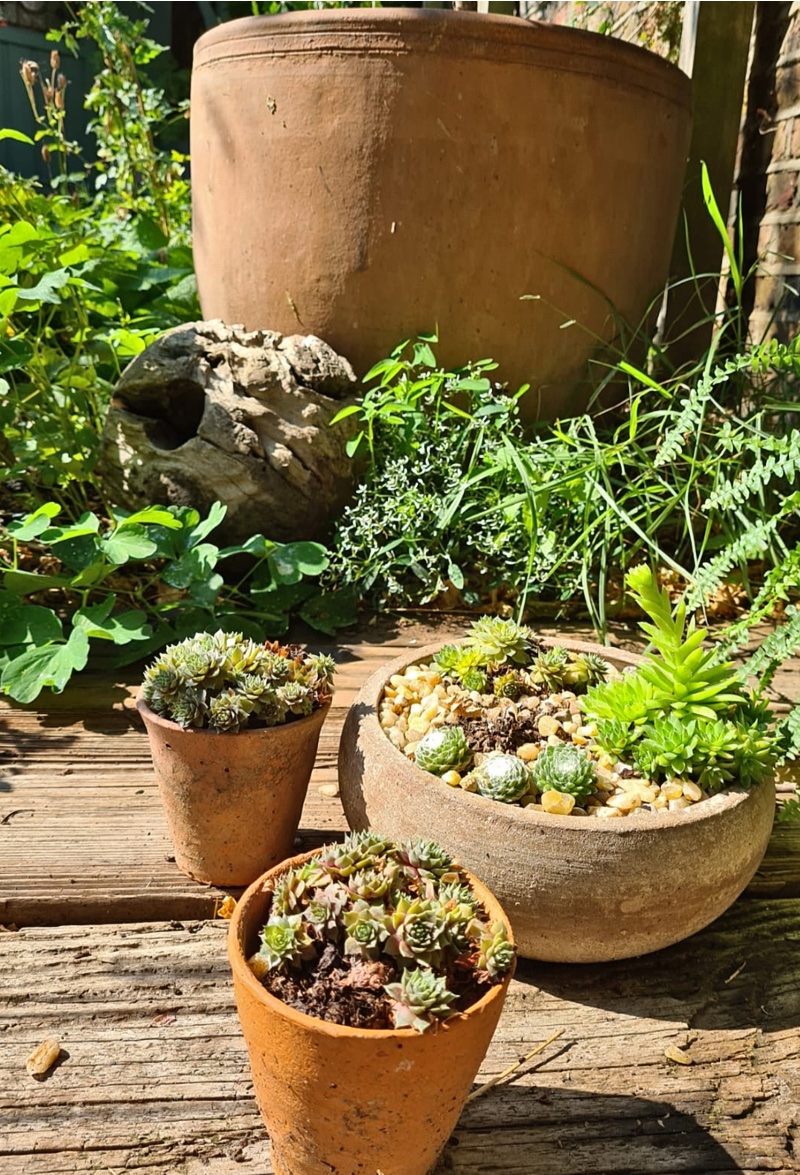
Existing pots and planters were recycled and wildlife friendly planting was retained.
Useful, wildlife friendly planting was retained and any unwanted plants were donated to other gardeners. A mature Elder was a prominent existing feature. What plant can better connect us to the environment and other lifeforms? In winter it looks a wreck and we wonder will it manage to limp on through to spring? But what a change once the sap starts to rise. The leaves come on early, connecting us to the cycle of re-birth out of decay. The summer flowers are an insect magnet and can be made in to refreshing drinks. The autumn berries feed birds and small mammals whilst boosting our immune systems through winter when processed in to medicinal food and drink. Dried out Elder canes are also the best material for the hand drill-one of the first ways our ancestors kindled fire. Try it yourself to fully appreciate their achievements! Plants of this kind re-connect us with our history and birthright and, in doing so, help dispel the illusion that we are somehow ‘outside’ of nature. Through constant exposure to the damaging aspects of our existence we have grown to believe degradation is our hallmark. Gardens are the one of the arenas in which we can reassert the positive elements of human intervention and perhaps see our purpose on this planet.
Specify plants and hardscape that don’t need mollycoddling. Opt for resilient plants and stone and timber types that don’t need constant sealing or cleaning. Reclaimed materials achieve this end and also tick the sustainability box- they have not been newly created and therefore no further finite resources have been consumed. In terms of timber, we used reclaimed Douglas Fir decking and shelving and reclaimed Oak for the seating block/retaining wall in this garden. Reclaimed slate and granite was used for the paving. Jilayne and the client went shopping in local markets for the second hand furniture, fixtures and fittings. All the reclaimed materials were of British provenance. When reclaimed wood cannot be used specify locally sourced FSC-certified timber from trusted suppliers.

Reclaimed timber, slate and granite were used throughout the garden as well as second hand furniture, fixtures and fittings.
Permeable surfaces allow rain water to percolate back in to the ground and to that end gravel was used extensively in this garden. More generally, look to make surfaces more porous with the aim of increasing biodiversity. Block and brick retaining walls could be replaced with gabions which allow unwanted existing materials such as paving and walling to be used as in-fill.
Sustainable gardens aim to be as ‘soft’ as possible. Planting should be diverse, successional and nectar-rich. Utilise a range of trees, shrubs, climbers, grasses and bulbs to provide food and shelter for wildlife. Don’t forget; attractiveness to humans is of equal importance if the garden is to be considered a success by the client!
Go easy on garden lighting and chemical weed and pest control. Neither were used in this scheme.
However, the garden wasn’t a perfect example of sustainability. There were a number of areas where our activities were damaging;
- Cement and adhesives were used. Both material have a high environmental impact.
- Fossil fuels were consumed and pollutants produced in travelling to and from site.
- Space restrictions dictated all deliveries were bagged. To reduce waste specify loose deliveries wherever possible.
- Gravel extraction degrades wildlife habitat.
How can we improve? At Landscaping Solutions we are committed to continual professional development through seminars, courses, workshops and personal study. Integration of environmental assessments to our CDM process helps us think about how we can reduce our impact and guides our landscape design decisions and installation techniques. This is a great tool but can only take us so far due to the fact that much of the raw information is based on intuition. There is a need to develop an industry accepted framework to help us better understand the relative impact of various materials and practices. For instance, we might assume artificial turf to be more impactful than paving but in some instances artificial turf allows the ground to ‘breath’ more than paving. Leave artificial turf to its own devices and it develops into ‘habitat’ much quicker than paving, rapidly hosting an array of plant and invertebrate life. However, can it be recycled satisfactorily? And which of these is most environmentally impactful; quarried British Yorkstone or Italian porcelain? What about quarried Indian sandstone v Italian porcelain? Or Indian sandstone v Indian porcelain. Yorkstone v Portland Stone? Portland stone from open cast extraction v undersea deposits? These are complicated questions.
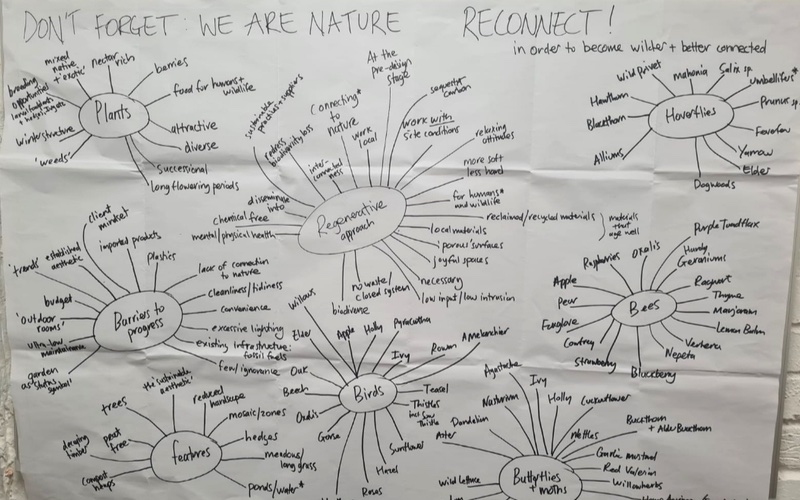
Regular brainstorming sessions helped guide our design decisions and installation techniques.
Good reliable information will enable us to compile a database of suppliers employing sustainable practices. For ‘The Urban Retreat’ we used Ashwells Timber and CED Stone.
Responsive clients might be encouraged to engage with food production be it wild or cultivated and on whatever scale possible. This takes the pressure off the industrial agricultural system, promotes personal resilience, self-sufficiency, understanding of our role in the ecosystem, empathy with other life forms and mental and physical health. Studies have shown low-input vegetable and fruit allotments to be the most biodiverse land use in the country. They can be further improved by providing a body of water and adding on-site composting facilities.
One last piece of advice; don’t forget to have fun!
HOW TO FIND THE BEST GARDEN MAINTENANCE COMPANY
A properly maintained garden brings new joy in being outdoors, gives new life to your property, and removes the worry at not keeping on top of things.
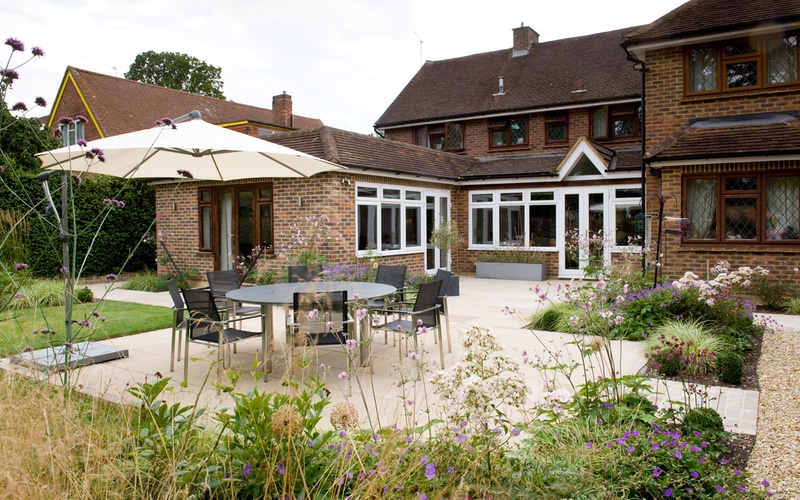
Garden built and maintained by Landscaping Solutions
Finding a garden maintenance company to suit you, though, can create its own headache. Based in Surrey and South West London, we at Landscaping Solutions have come to understand what our clients value most. With this knowledge, we’ve put together a list of questions for you to ask garden services providers, so that you can more easily find the one that matches your needs.
How experienced are you?
The best garden maintenance, which lets you relax in the knowledge that every aspect of your outside space is being cared for, is not about “mowing and blowing” or just providing weeding services.
Too often home-owners find their shrubs trimmed into an amorphous blob, or an array of identical lollipops. Neat, but hardly allowing the personality of your garden to shine.
It’s an approach which often betrays a lack of experience. To bring out the best in a garden requires people who have built up a bank of knowledge and have plenty of experience at the sharp end of garden maintenance.
Extensive knowledge of perennials, shrubs, trees and annuals, an understanding of clever underplanting, layering and seasonal colour ensure that over the year your garden gains in character and interest, becoming the best fit for your lifestyle and how you want to enjoy it.

Garden built and maintained by Landscaping Solutions
Are you based locally?
This might seem an odd question to throw in, but the more engaged a company is in your locality and the longer they’ve been in operation, the more they’ve come to understand local conditions - what grows well in one area compared with another, how soil conditions vary, slight differences in weather patterns. Employ a company based at some distance from your location and it could make the wrong sort of difference to the success of your garden maintenance programme.
How can I trust that you’re as good as you say you are?
Some people can talk up a storm, but it helps to have proof.
Membership of a professional organisation is an indicator of a company with high standards. There are a number of organisations to look out for; the British Association of Landscape Industries (BALI) is one which only permits members who maintain necessary standards, carries out inspections, and demands members carry public liability insurance.
You can’t beat an actual example, though.
So, now is a good time to ask if your prospective garden services company can point you to any gardens locally that they look after.
Can you work the way I want you to?
This is an interesting one, and it’s worth thinking about what you want from a garden maintenance company before beginning your search. You are, after all, looking for a long-term relationship with someone who’s happy to work with you in the way that suits you.
This might mean that you just want to come home to an attractive garden in good condition where you can entertain and relax without ever having to think about details. You might have planting plans that you’d like to implement but can’t do yourself, or want to increase the wildlife-friendly elements of your garden. You might like to be fully involved, with regular updates on work being carried out, and regular discussions about the garden’s development and the particular plants we recommend incorporating and features you’d like added.
The response and degree of enthusiasm from a prospective company to an explanation of your preferred methods will help you gauge how suited it is to your way of life.
About Landscaping Solutions’ Garden Maintenance Service
Ben West established Landscaping Solutions in 2005, with sixteen years’ experience of landscaping and horticulture under his belt. With our staff of experienced landscapers, Landscaping Solutions contains a deep well of knowledge and skills which will breathe new life into your garden.
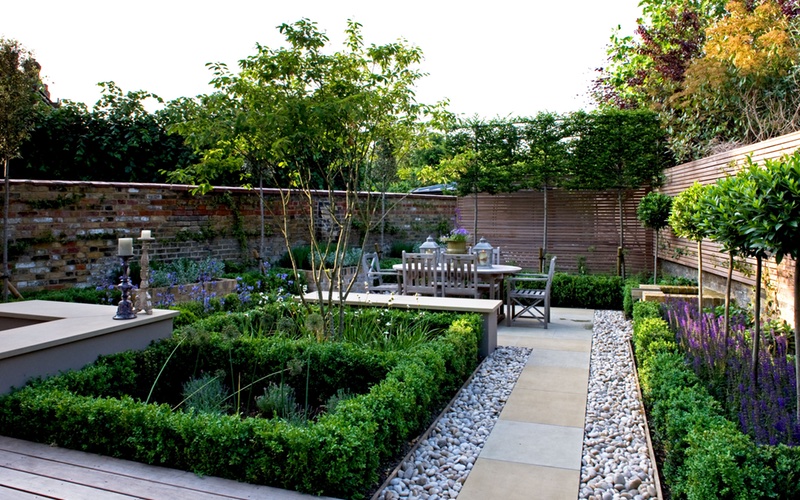
Garden built and maintained by Landscaping Solutions in Barnes, South West London
We are also full members of the British Association of Landscape Industries (BALI) and, in addition to our garden maintenance work, collaborate with leading garden designers to build award-winning garden designs.
Working with you
We’re happy to work in the way that suits you best, from having the most general instruction to keep the garden looking good (we’ll make sure we know exactly what this means to you first) through to having a regular meeting with you to discuss what you’d like done next.
We take enormous pleasure in working with garden owners to maintain their garden to the highest standard and, if desired, to help develop it. With extensive knowledge of perennials, annuals, shrubs, trees and annuals, we’ll plant and prune with an eye to the coming seasons as well making your garden look its best in the immediate present.
We can help you develop your garden over time with your children or grandchildren in mind, adding age-appropriate features as they grow, helping you to connect them to Nature.
Seasonal tasks are not restricted to plants and lawns, unless you want them to be. We will also carry out ongoing garden maintenance on hard landscaping, decking and fences, including repairs and painting.
We’re upfront about what we can’t do, so if you ever need a large tree cut down, for example, we’ll direct you to a qualified tree surgeon.
Working with Nature
With Nature much in the spotlight these days, and climate change, pesticides, diminishing insect populations and habitat destruction frequently in the news, it’s reassuring to know that small differences can make a difference. At Landscaping Solutions we have the knowledge to help you make your garden as Nature-Friendly as possible while suiting your lifestyle and garden layout.
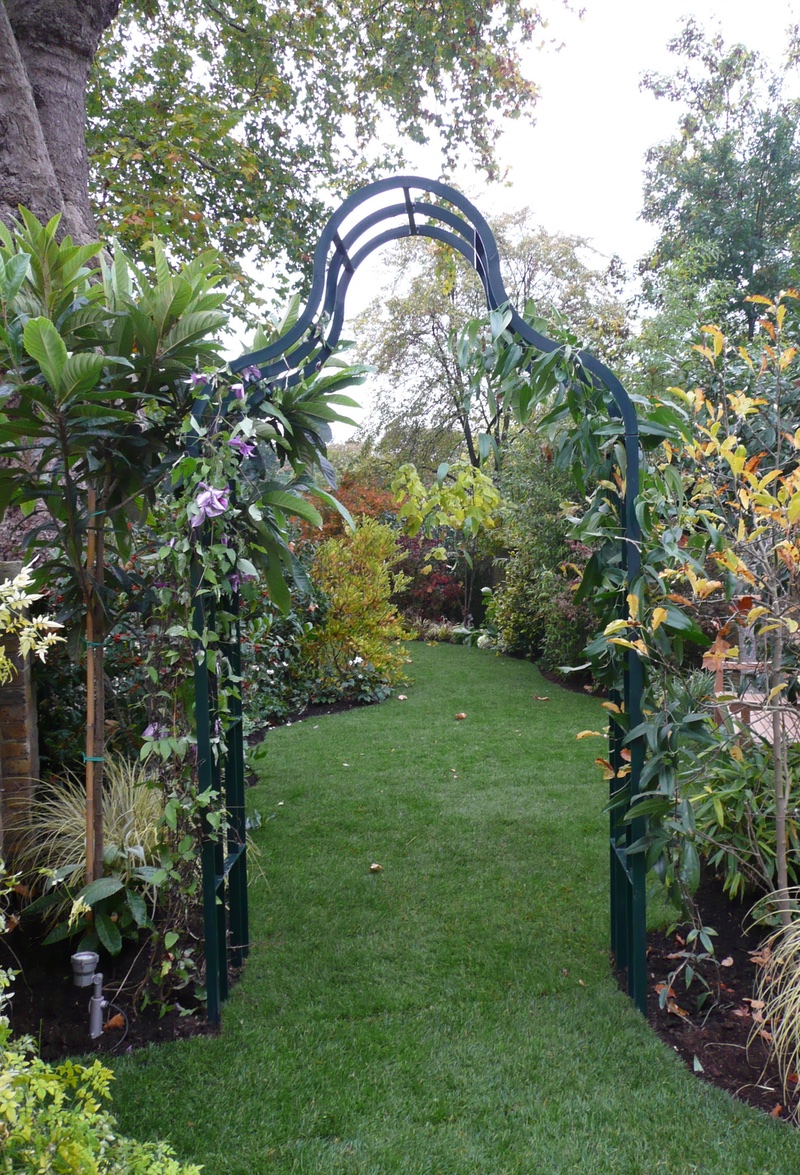
Garden built and maintained by Landscaping Solutions
What Landscaping Solutions offers
What we offer is a custom garden maintenance service, tailored to your garden, your pocket and the way you want us to work. We seek to enjoy a good long-term relationship every bit as much as you want to find someone you’re happy with for a long time to come.
All we ask is that you have a garden with enough work to occupy at least one gardener for one full day. That could be a medium-sized but intensively planted garden with several features, or a large, simple spread with lots of ground to cover. We’re happy to come and advise.
Where to find us
Landscaping Solutions offers garden services in Surrey and South West London, particularly the TW, SW, GU and KT postcodes. Our radius includes Molesey, Esher, East Horsley, Cobham, Weybridge, Kingswood, Kingston and Richmond.
For more information and an informal chat about our garden maintenance service, contact Ben West on 0208 241 2402, or email info@landscapingsolutionsltd.co.uk to ask us to give you a call.
TEAMING UP WITH LANDSCAPING SOLUTIONS
“It definitely brings us closer. You see a different side of people.” This is Landscaping Solutions’ Operations Manager James Double’s verdict on our annual camping trips. Perhaps that’s not surprising when you find out what owner Ben West gets us doing.

Landscaping Solutions’ Ben, George, James, Frank, Jack, Tom and Hudson.
When our social events take place outside work, they usually involve something like golf, go-karting or football. “If I organise something,” says Ben, “we’ll end up doing activities that most of us haven’t done before - friction fire-lighting, bushcraft skills, swimming in rivers, hill-walking on Brecon Beacon.”
Ben’s been wild camping since he was ten, and the trips are now a feature of the firm. Contracts Manager Tom Underwood hadn’t ever camped when he joined the company just over seven years ago. “I wasn’t into it, but I really look forward to it now,” he says. “I’m already looking forward to the trip for this year.”

The trips certainly aren’t compulsory and we don’t have to venture far - a recent camp-out was in the Surrey Hills - but they do offer a chance for us to get to know each other better over a couple of days. “Most love it,” says Ben. “You don’t always get to mix with everybody in the firm, so you’re meeting other people you might have heard of and not worked with. It’s letting hair down in general.”
“It’s team building,” says Tom. “Two or three days in the wilderness with nothing but yourselves. It definitely contributes to well-being and happiness, and if you’re happy in work, then you do it better.”

A BALI award-winning garden, London, designed by Simon Thomas and built by Landscaping Solutions.
Teamwork is vital to a landscaping practice and is at the heart of Landscaping Solutions. It stands to reason that if three or four of us are working on a site for several weeks, the better we understand each other, the better we work together. “Teamwork is very important to the company. I’ve noticed that people coming from other firms say that they like the banter and the fun,” says Ben. “You’re spending most of your life doing this, so if it’s not fun, there’s not much point in having the job. The trips away help to create camaraderie, and it’s calming being out amongst the bird song and around the fire. As soon as you’ve got a fire going in the dusk, people talk about things that they rarely talk about otherwise.”
“We’re a close group,” says Tom. “I pass on what I’ve learned, and the guys teach me; I’m always ready to learn.”
And if you’re wondering how this plays into Landscaping Solutions’ work, then take a look at some of our BALI award-winning gardens.

Alongside teamwork goes the ethos of recognising the talent we’ve got. “The culture of Landscaping Solutions is to promote from within,” says Ben. “We take on young guys and the team supports them to give them the skills and take on responsibility. That’s the most successful way to get people into responsible roles,” he adds.
James joined around seven years ago, was promoted to foreman and now works alongside Ben in the office. Tom, who joined at around the same time, also became a foreman and is now Contracts Manager, overseeing all the teams, giving toolbox talks, ensuring everyone has the workwear, PPE and materials they need. For the guys who moved into the gaps left by their promotion, James and Tom are on hand to monitor and give support.

A BALI award winning garden, London, designed by Jilayne Rickards and built by Landscaping Solutions.
We think the results speak for themselves. The recent BALI awards gave us our 5th award over 7 years, two being Principal Award Winner. Of the latest winner in December 2018, designer Jilayne Rickards said, ““The finish was exquisite, because that’s how Landscaping Solutions work.”
So, when you commission Landscaping Solutions for your garden project, we’ll not just enjoy building it. You’ll also know you have a tight-knit team who will work together to give you the best result possible, maybe even a BALI award-winner.
For a discussion on how we can help with your next garden project, contact Ben on info@landscapingsolutionsltd.co.uk or the number at the top of the page.
CONSTRUCTION DESIGN AND MANAGEMENT – HELP FOR GARDEN DESIGNERS
CDM - Construction Design Management - is something we’ve noticed makes a lot of garden designers nervous. Brought in in 2007 and revised in 2015, the Construction (Design and Management) Regulations demand that every project has suitably qualified and experienced duty holders in place, to shoulder the designated responsibilities and, in the case of designers, this consists of “identifying, eliminating or controlling foreseeable risks”.
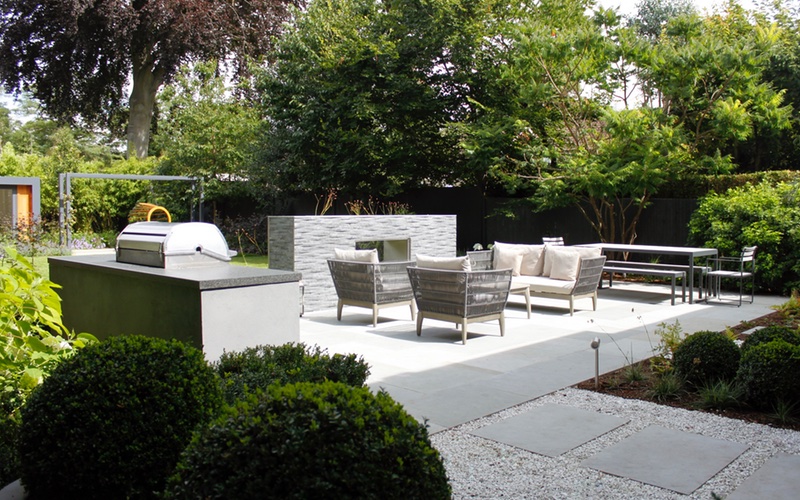
A finished project for a garden near Richmond.
The regs also demand that designers prepare and provide relevant information to those who need it and liaise with the principal contractor “to help in the planning, management, monitoring and coordination of the construction phase”.
Put like that, it’s understandable that, as the regulations finally begin to filter into the landscaping industry, there are a few qualms. Funnily enough, it’s the domestic sector that’s feeling the burden most, rather than contractors working on the commercial side; when you’re working for the likes of Taylor Wimpey you’ll be a very big fish to be principal anything.
Working for home-owners is different. They, too, have their responsibilities, but aren’t expected to understand them. Former BALI chairman Richard Gardiner runs Nag Solutions, which helps landscape companies improve their compliance credentials, and sums up the situation this way. “The problems come in the domestic sector. There’s no pressure from the client, the home-owner, and you wouldn’t expect them to be up to speed. It’s more challenging than the commercial sector because most of the time the domestic contractor operates as principal contractor, and a lot of responsibility sits with the principal contractor. Contractors do tend to bury their heads a bit.”

Machinery should be placed in a safe position.
It’s the same with designers. “Again, they bury their heads,” he says. “The designer is the interface with the client. If they are aware of what they should be doing, then they should guide the client.”
At Landscaping Solutions, our heads are well and truly above ground. Some time ago, we took a good hard look at what is demanded and how far we fulfilled it, and we brought Richard in as the expert to check us over for any gaps in our approach. Consequently, we’ve embraced CDM with quite a bit of enthusiasm.
Why? Ben West, owner of Landscaping Solutions explains, “It’s going to increase professionalism and bring the landscaping industry in line with the rest of the construction industry, which is quite far ahead of us in this area. It’ll reduce accidents by making the consideration of risks and hazards part of the design process, so that, hopefully, they’re designed out of forthcoming schemes. And it’s going to make the finished garden a safer place for the homeowner and their visitors.”
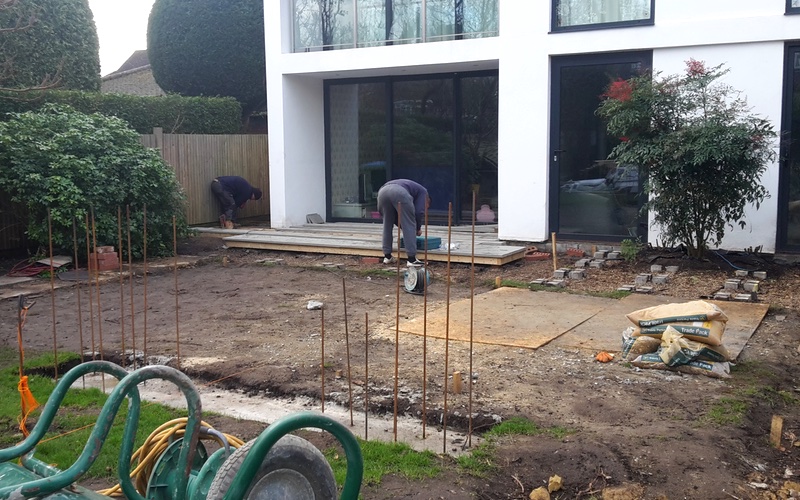
A tidy site is a safer site.
What this means for you, as a designer, is that we know what’s needed and can help you with your responsibilities. “We recently did a job for a lady who wasn’t sure what CDM meant,” says Ben. “We provided her with documentation, the people she could speak to, links with various websites, and looked at her current documentation to see if it was rigorous enough.”
If you’re a home-owner reading this, then you can rest easy that we understand our duties and carry them out. It will also potentially reduce your costs by flagging up potentially massive additions to the bill brought about by, for example, the use of oversized, heavy paving that will need cutting on site in hard-to-access gardens where the only solution is to bring in a crane and then cut by hand.
When you’re not used to doing something, and there are plenty of other things taking up valuable time, then getting to grips with CDM is daunting. But it doesn’t have to be.
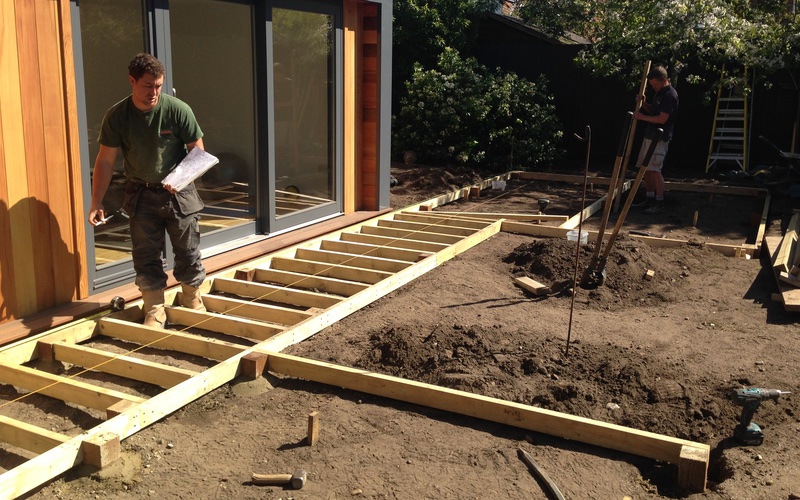
Landscapers should have all the appropriate work equipment and footwear for the job.
Paramount in CDM is the need to communicate. “Essentially, the designer should do a risk assessment for their design and talk to the contractor,” says Richard Gardiner. “The contractor might come up with a different way to solve a problem which is more satisfactory. All parties need to be in communication, putting the client, designer and contractor in tune with each other.”
If you’ve read our post on The Secret to a Bali Award-Winning Garden, then you’ll know that communication is one of our priorities. That project demanded hundreds of both emails and phone calls. If a problem occurs, we’ll let you know. If a schedule needs to be rejigged because of a delayed delivery, we’ll tell you. If we foresee a pitfall in the way things are scheduled, we’ll suggest a solution.
CDM doesn’t have to be feared. It’s raising standards across the industry and that has to be applauded. However, everyone can do with a bit of support, especially when something’s new and full of legal implications.
“CDM is a good thing,” says Ben. “With any of our projects, we’ll be happy to offer advice to designers who are a bit unsure, and it’s a chance for everyone in the industry - landscapers and designers - to show clients and designers that we take our responsibilities seriously and recognise our duty of care to fellow contractors and our clients.”
If you’d like to discuss how we can help with the CDM requirements of your next project, give us a ring on 0208 2412402 or email us at info@landscapingsolutionsltd.co.uk
Richard Gardiner can be contacted at Nag Solutions.